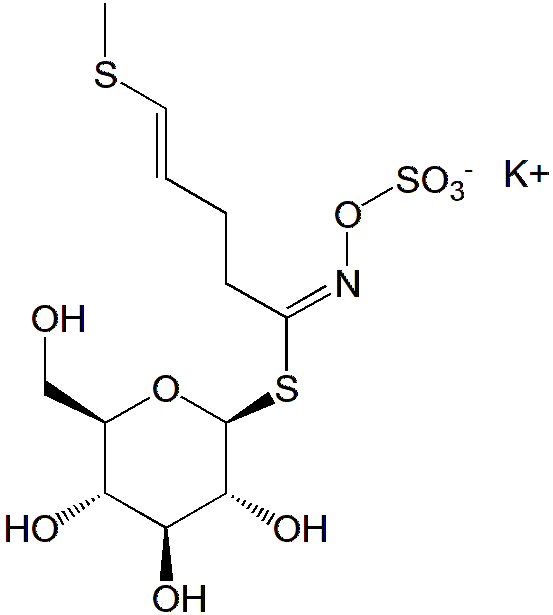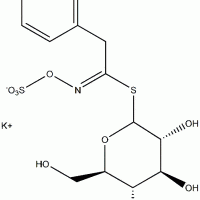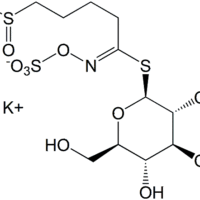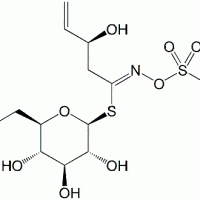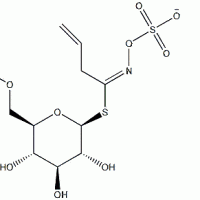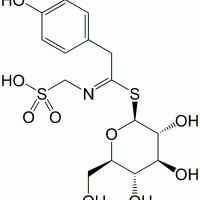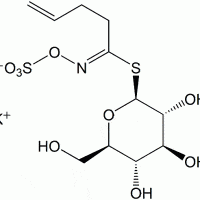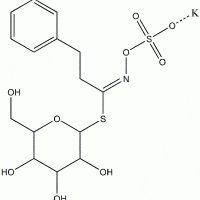- Required Weight missing.
Abstract
Glucoraphasatin (CAS 245550-64-5) is in a group of sulfur-containing glycosides called glucosinolates. Glucosinolates are mainly present in cruciferous or brassica vegetables, such as radish, cabbage, cauliflower, rapeseed, and mustard. The sulfur group results in the pungent smell. Research indicates the beneficial effects of glucosinolates. These effects include regulatory functions in inflammation, stress response, phase I metabolism, antioxidant activities, and antimicrobial properties.
Glucoraphasatin is a glucosinolate that is isolated from cruciferous vegetables, including radish (Raphanus sativus). Whereas glucosinolates are not active anticarcinogens, they are converted by the plant enzyme myrosinase and by the flora of the gastrointestinal tract into isothiocyanates. Isothiocyantes are extremely effective blockers of carcinogenesis. Sulforaphane is a reactive isothiocyanate that potently inhibits neoplastic cellular processes and prevents a number of disease states.
Glucosinolates are sold as their potassium salt form.
Follow this link for our entire collection of glucosinolate reference standards.
Compound Details
| CAS # | 245550-64-5 |
|---|---|
| Molecular Weight | 457.6 |
| Chemical Formula | C12H20KNO9S3 |
| IUPAC | potassium;[(E)-[(E)-5-methylsulfanyl-1-[(2S,3R,4S,5S,6R)-3,4,5-trihydroxy-6-(hydroxymethyl)oxan-2-yl]sulfanylpent-4-enylidene]amino] sulfate |
| SMILES | CS/C=C/CC/C(=N\OS(=O)(=O)[O-])/S[C@H]1[C@@H]([C@H]([C@@H]([C@H](O1)CO)O)O)O.[K+] |
| Purity | 95%+ |
| Storage Temperature | <-8C |
| Storage Conditions | Freezer |
Product Use Disclaimer
Products are sold as laboratory reference materials, to be used for diagnostic and in vivo testing. The samples are not certified for veterinary or human use.
$35.00 - $39.00 / milligram
| Range (milligram) | Price ($/milligram) |
|---|---|
| 5 - 24 milligram | $39.00 / milligram |
| 25 - 49 milligram | $37.00 / milligram |
| 50 - 100 milligram | $35.00 / milligram |
Technical Support
Product information is from published literature. Due to the nature of scientific experimentation, results or specific product application may vary (e.g., selectivity, detector response). If you have questions about the product, its application, and associated analytics, please contact our technical support team.
Related products
-
View Item
Glucotropaeolin Potassium Salt – CAS 5115-71-9
$13.80 - $18.00 / milligram -
View Item
Glucoraphanin Potassium Salt
$14.55 - $17.75 / milligram -
View Item
Progoitrin – CAS 585-95-5
$11.80 - $16.00 / milligram -
View Item
Sinigrin Potassium Salt – CAS 3952-98-5
$3.50 - $4.50 / milligram -
View Item
Sinalbin – CAS 19253-84-0
$13.00 - $18.00 / milligram -
View Item
Gluconapin Potassium Salt
$13.80 - $18.00 / milligram -
View Item
Gluconasturtiin Potassium Salt – CAS 18425-76-8
$13.80 - $18.00 / milligram


